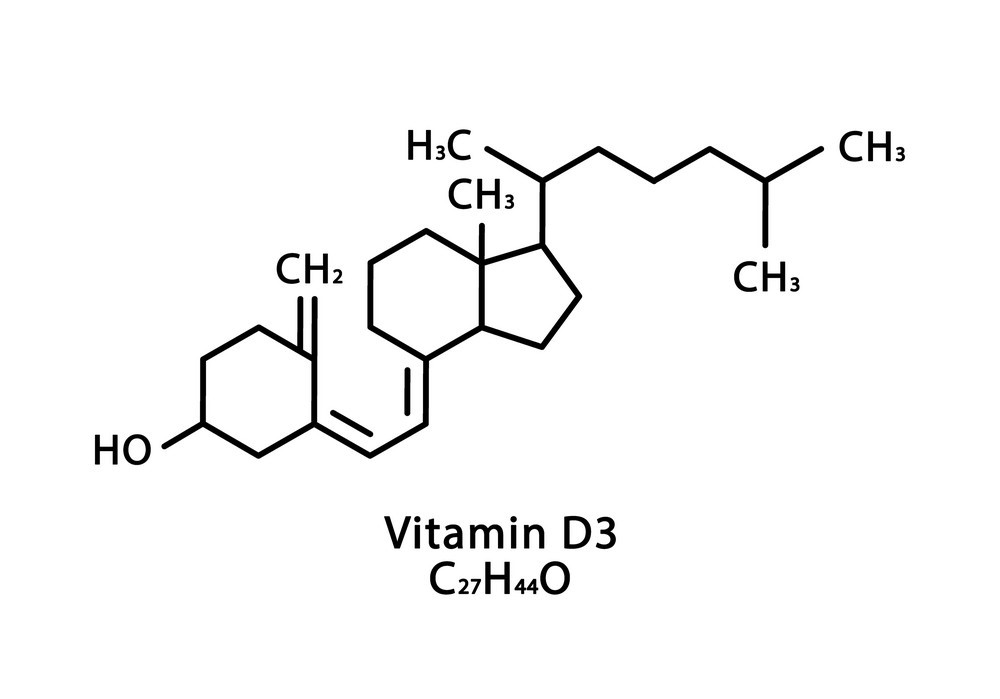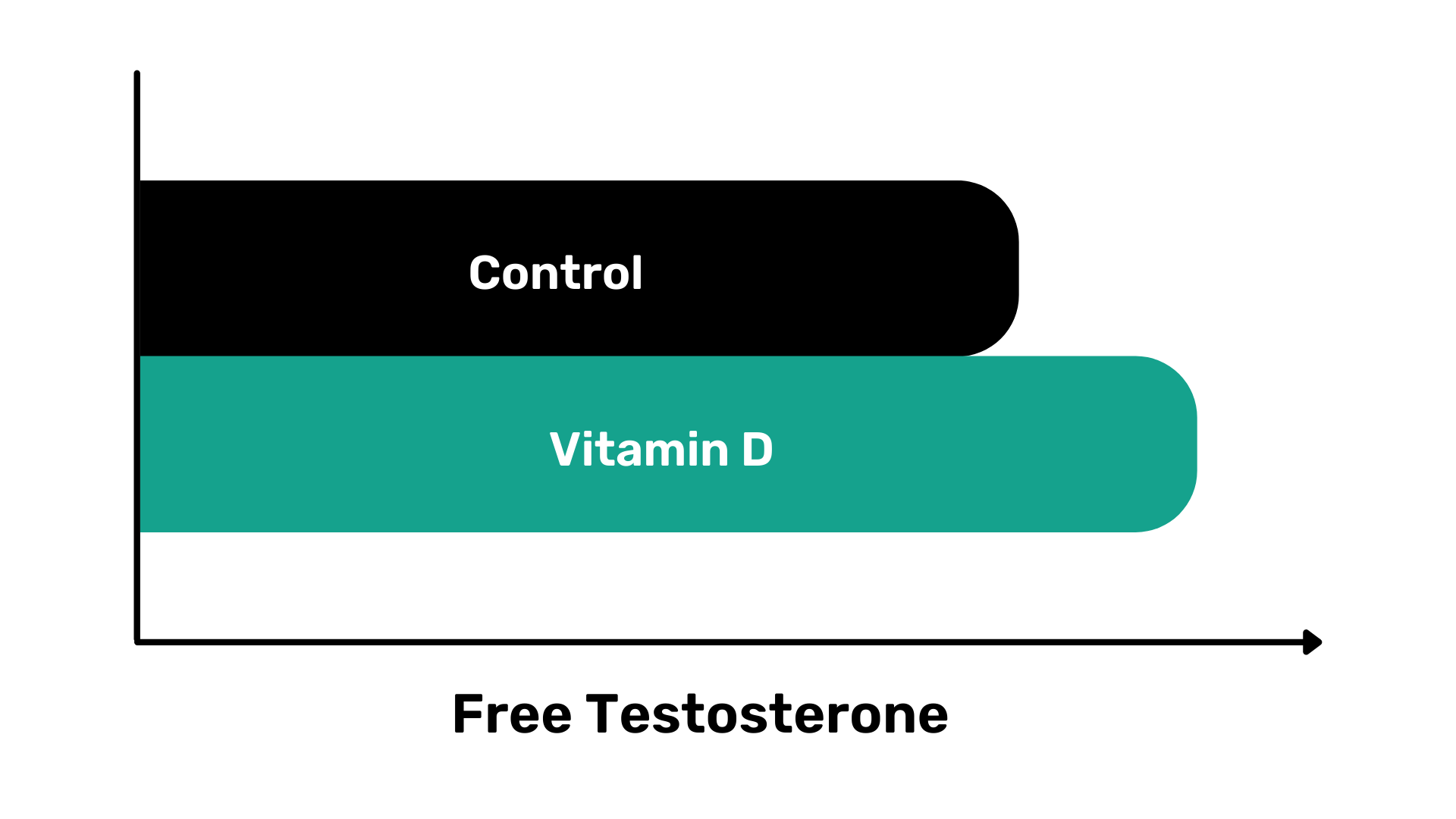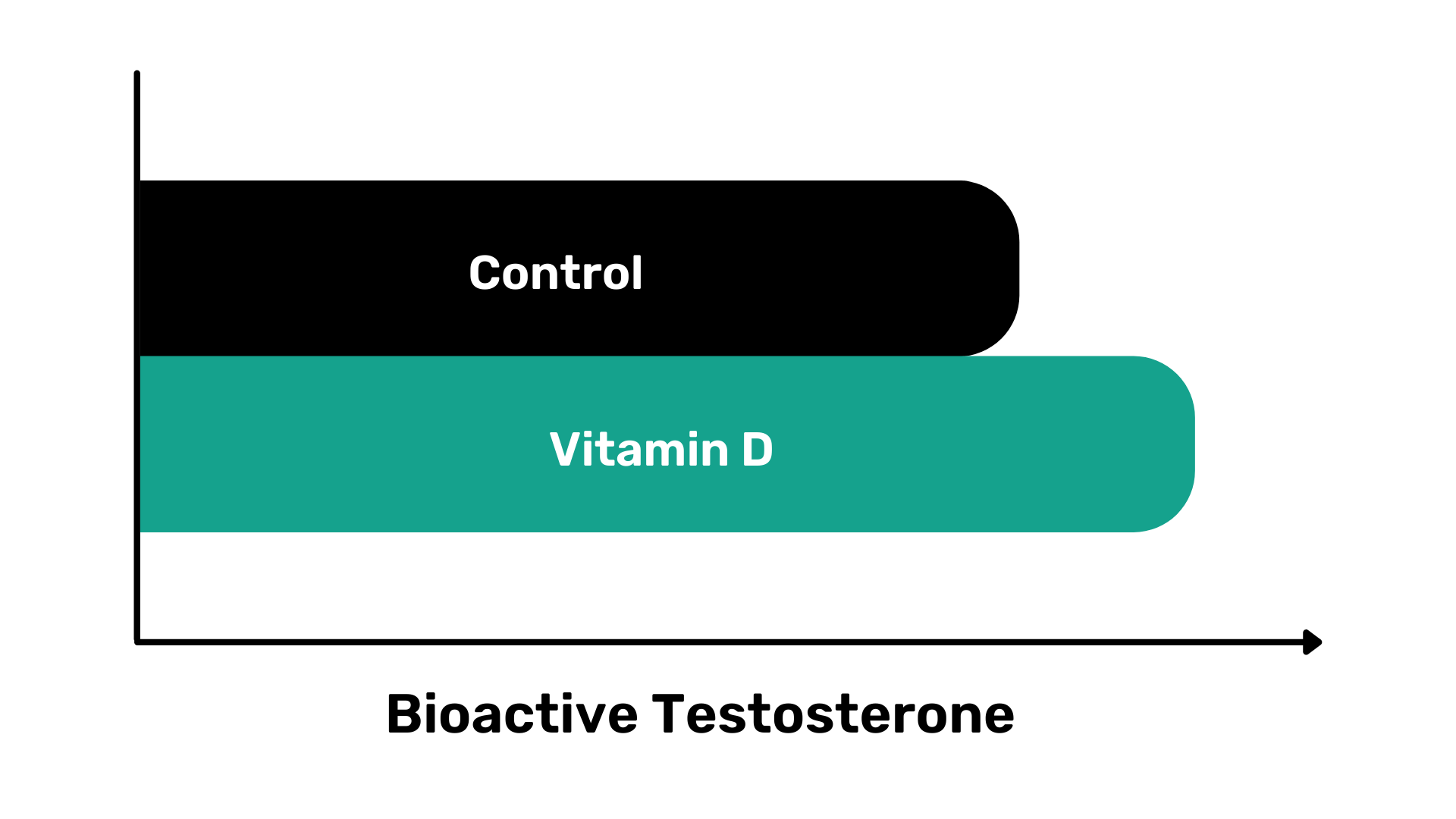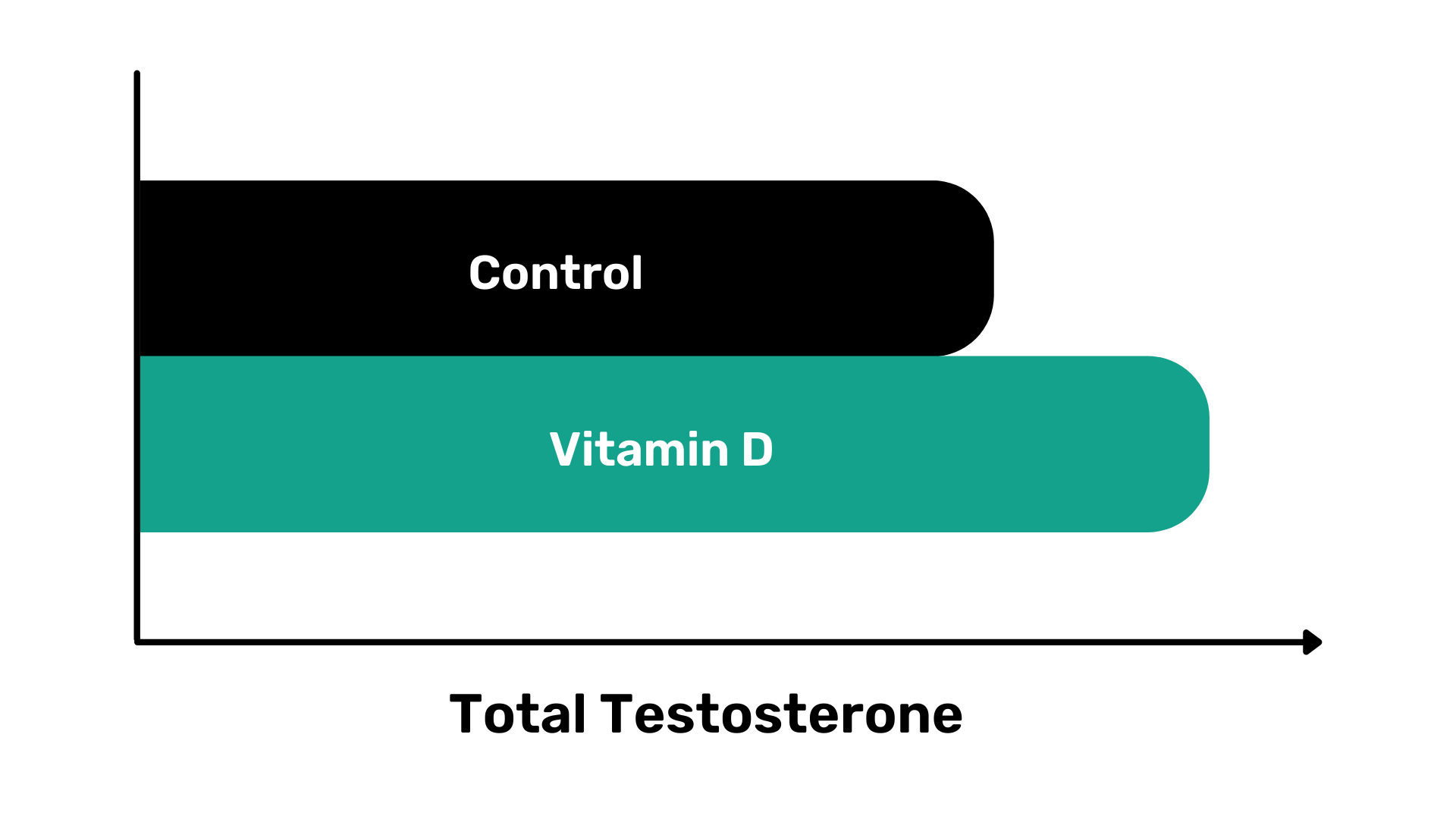
How ZMA Can Boost Your Immune System
Wondering how to boost your immune defences and fight against illness? Discover the science of ZMA and how it can help your immune system.

Vitamin D is the sunshine vitamin that is so much more than a daily dietary requirement.
This essential micronutrient, obtained through sun exposure, certain foods, and supplements, serves as the powerhouse behind many bodily functions.
From enhancing testosterone production to maintaining bone and heart health, boosting immunity, regulating mood, and improving muscle strength, vitamin D wears many hats. Yet, striking the balance for adequate intake is a challenge for many.
Read on to uncover the numerous effects of this vitamin and understand why it’s a vital part of your health journey.

Vitamin D is a fat-soluble micronutrient that is essential for various physiological processes in the body.
There are two major types:
These two forms of vitamin D are biologically inactive, and must undergo two hydroxylation processes in the body for activation; the first in the liver and the second in the kidneys. The resulting compound, calcitriol, is the active form of vitamin D.
The Institute of Medicine, Food and Nutrition Board define the Recommended Dietary Allowance (RDA) of vitamin D as 600iu per day for men. As the RDA is the daily intake of a nutrient considered sufficient to meet the requirements of 97.5% of healthy individuals, any daily vitamin intake values below 600iu pose increased risks to health for 97.5% of people.
One study considering the levels of vitamin D in the UK population found that roughly 60% of adolescents, adults and the elderly have insufficient levels of zinc, and therefore higher risk to various adverse health effects.

The primary natural source of vitamin D is sunlight exposure. When the skin is exposed to UVB radiation from direct sunlight, a form of vitamin D called cholecalciferol (vitamin D3) is synthesized in the body.
However, the ability to produce enough vitamin D from sunlight depends on factors like geography, season, time of day, age, skin pigmentation, and sunscreen use. In countries where the sun is not always shining and days are shorter, getting enough vitamin D from sunlight becomes particularly difficult.
Melanin is a substance in your body that produces hair, eye, and skin pigmentation. People with higher melanin levels, and therefore dark skin, produce less vitamin D per unit of sunlight received, and therefore people with lighter skin generally produce more vitamin D when exposed to the same amount of sunlight as those with dark skin.
People should be cautious with excessive sunlight exposure though. Too much sunlight can lead to an increased risk of skin cancer, and should therefore care should be taken to avoid excessive sun exposure.
Vitamin D can also be obtained through a healthy diet. Dietary sources of vitamin D include these foods:
While these sources can give us adequate levels of vitamin D, it can be challenging to obtain sufficient amounts consistently, particularly for individuals with limited sun exposure or specific dietary restrictions.
As mentioned previously, a substantial portion of the population finds it difficult to get enough vitamin D on a consistent basis.
As a result of this, vitamin D supplements can play a crucial role in ensuring people get adequate amounts. Supplements are typically in the form of Vitamin D3, and in doses high enough, can rectify vitamin D deficiency and improve numerous aspects of people’s health.
Vitamin D is essential for healthy function of our bodies. It has a number of key beneficial effects, including avoiding and helping significant health problems. Key effects are summarised below.

Vitamin D levels have been shown to have a positive correlation with testosterone levels and efficacy in men, vital for men’s health. Research has demonstrated that sufficient levels support healthy testosterone production, and this is particularly helpful for individuals experiencing symptoms of testosterone deficiency.
It does this through enhances the function of leydig cells and reducing Sex Hormone-Binding Globulin (SHBG) levels.
Vitamin D plays a crucial role in regulating calcium and phosphorus levels in the body, which are essential nutrients for maintaining healthy bones and bone strength.
It aids in the absorption of calcium from the intestine and helps deposit calcium in bones, promoting their strength and density.
The mechanism by which vitamin D improves bone health is through its interaction with parathyroid hormone (PTH). PTH stimulates the release of calcium from bones into the bloodstream. vitamin D, on the other hand, suppresses PTH production when blood calcium levels are sufficient, to prevent excessive calcium loss from bones.
In addition to this, vitamin D enhances the absorption of dietary calcium in the intestine, making further improvements to bone health and helping to avoid/reduce bone deformities.

Vitamin D supports the immune system and helps defend against infections and disease. It enhances the function of immune cells, including T-cells and macrophages, which are crucial for fighting off pathogens.
When pathogens invade the body, vitamin D promotes the production of antimicrobial peptides, which are substances that help destroy bacteria, viruses, and fungi. These peptides work by disrupting the cell membranes of pathogens, rendering them ineffective.
Moreover, vitamin D enhances the ability of immune cells to recognize and destroy pathogens, thus bolstering the overall immune response to disease.
Vitamin D plays a role in brain function and mood regulation. Low levels have been linked to an increased risk of depression, Seasonal Affective Disorder (SAD), and other mood disorders.
One way in which it affects mood is through its influence on serotonin production. Serotonin is a neurotransmitter associated with feelings of happiness and well-being, and vitamin D helps convert the amino acid tryptophan into serotonin, thereby supporting positive mood.
Additionally, vitamin D receptors are present in areas of the brain involved in mood regulation, further highlighting its importance in mental health and depression.

Research suggests that vitamin D may have cardiovascular benefits. It helps regulate blood pressure, reduces inflammation, improves endothelial function, supports overall heart health, and reduces the risk of heart disease, heart attacks, and stroke.
The protective effects of vitamin D on the cardiovascular system are multifaceted. It helps regulate blood pressure by influencing the renin-angiotensin-aldosterone system, a hormone system involved in blood pressure control. It also reduces inflammation, which plays a significant role in the development of cardiovascular diseases.
Furthermore, vitamin D promotes the production of nitric oxide, a molecule that improves endothelial function (a thin layer cells on the interior of blood vessels) and blood flow, contributing to heart health.
Vitamin D is important for maintaining optimal muscle strength and function. It aids in muscle contraction and helps improve muscle performance. As such, vitamin D supplements can improve overall muscle strength.
Vitamin D exerts its effects on muscle strength and function through various mechanisms. It enhances the synthesis of proteins involved in muscle contraction, thereby improving muscle performance.
Additionally, vitamin D helps regulate calcium levels in muscle cells, which is essential for proper muscle contraction. By ensuring adequate levels, individuals can optimize their muscle strength and improve overall physical performance.
Vitamin D has been shown several times to increase levels of testosterone in men, particularly in men with low testosterone levels. Some key studies and their findings are summarised below.



The mechanisms in which vitamin D and vitamin D supplements increase testosterone levels in men are outlined in the following sections. Each is related to Hypothalamic-Pituitary-Gonadal (HPG) axis, which is responsible for producing, regulating, and distributing testosterone.
Leydig cells are located in men’s testes and responsible for the production of testosterone. When they receive a signal from the pituitary gland in the brain, in the form of luteinizing hormone, they begin converting cholesterol into testosterone. As a result, leydig cells’ functionality is critical to testosterone production.
Vitamin D facilitates proper leydig cell function.
Leydig cells have vitamin D receptors in them, allowing for vitamin D to bind to them and facilitate testosterone production when stimulated by luteinizing hormone.
One study investigated the effect of vitamin D in the cells in men’s Testes. It found that:
Sex Hormone-Binding Globulin (SHBG) binds to circulating testosterone and reduces how bioactive it is. The majority of testosterone produced by the testes is bound to it. By reducing the amount of SHBG in the body, less testosterone binds to it, and therefore more bioavailable and potent testosterone is free to act cross the body.
Vitamin D has been shown to reduce SHBG levels.
One study investigating the effect of vitamin D on testosterone and SHBG found that higher vitamin D levels were linked to low SHBG levels and high testosterone, and low levels were linked to higher SHBG and low testosterone. Therefore indicating that sufficient levels of vitamin D aid in not only the production of testosterone, but also its efficacy.

In summary, vitamin D is a fat-soluble micronutrient, sourced from sunlight exposure, diet, and supplements, essential for various physiological functions in the body.
The micronutrient plays a crucial role in testosterone production, bone health, immune function, mood regulation, heart health, and muscle function. It works by boosting testosterone production in leydig cells and reducing Sex Hormone-Binding Globulin (SHBG) to increase bioactive testosterone.
It also regulates calcium and phosphorus levels for bone health, enhances immune cell function, influences serotonin production for mental health, and improves muscle function and performance.
However, a significant portion of the population struggles with maintaining sufficient vitamin D levels, pointing to the importance of supplements for promoting overall health.
At StayPrime, we use vitamin D in our ZMAN+ supplement formula to enhance overall our customers overall wellbeing. Incorporate it into your daily routine to maintain your prime.


Wondering how to boost your immune defences and fight against illness? Discover the science of ZMA and how it can help your immune system.

Learn how ZMA can transform your muscle recovery and athletic performance, allowing you to reach your health goals

Studies have shown that testosterone levels are falling. Read this to find out why and what can be done to fix it.

Discover how Vitamin B6 reduces fatigue through energy metabolism, with key facts and intake recommendations.

Complete the form NOW to receive the free ebook and take on the challenge.